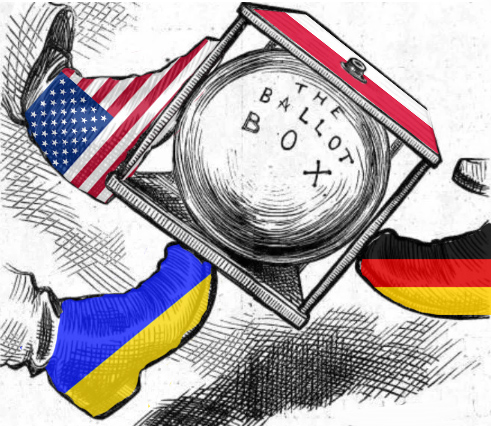
By John Helmer, Moscow
@bears_with
No one in Poland is in any doubt now that Tuesday’s missile attack on Przewodów* village, eight kilometres west of the Ukrainian border, was caused by a Russian-made missile fired by the Ukrainian military acting on the orders of President Vladimir Zelensky in Kiev. Two villagers were killed by the Ukrainian action. That Zelensky continues to deny this makes him a liar throughout Poland.
Polish President Andrzej Duda has made this official. “There is a high probability that it was a missile that was used for missile defense; that is, it was used by the Ukrainian defence forces”. Duda justified the action by telling Polish voters: “Ukraine defended itself – which is obvious and understandable – by firing missiles which were tasked with hitting Russian missiles.”
Duda was sharply and publicly corrected by the national party politician closest to the incident, Jaroslaw Pakula, the head of the Lublin City Council. “ ‘Of course, it’s a Ukrainian rocket. Of course, this is a provocation on the part of the Ukrainian authorities…The rocket could not be fired 100 km in the opposite direction by mistake.’ The aim of the provocation was to scare the EU and gain civil society support to send even more weapons to Ukraine, Pakula added. Instead of saying ‘fairy tales’ about the missile, the Polish president should tell Ukrainian Vladimir Zelensky that Warsaw ‘will no longer put up with this behaviour’ by Kiev.”
Pakula posted his commentary on his Facebook account. “I urge you to rethink Poland’s position [looking] at this war in case the red line is crossed again!” Pakula told Duda and the leadership of the Law and Justice Party (PiS) in Warsaw.
Zelensky told the Polish Government: “I have no doubt that this is not our missile. I believe that this was a Russian missile, based on our military reports.” In a full text of his remarks republished from Ukrainian into Polish by the state Polish Press Agency (PAP), Zelensky added: “It was not our rocket, not our missile strike…I am convinced that we should and will [take part in the Polish investigation]…I want us to be fair, and if it was the use of our air defense, then I want that evidence. First the investigation, access, and the data you [Polish government] have.”
The Polish news agency also reported the head of Ukraine’s National Security and Defense Council as claiming: “we are ready to provide our [Polish] partners with the evidence of the Russian footprint that we have. We also expect information from the partners, on the basis of which the final conclusion was drawn [by the Poles] that it is a Ukrainian air defense missile.”
Former Polish senator for the opposition party Civic Platform (PO, Robert Smoktunowicz, commented: “Not only have we not yet received an apology and expressions of regret from the president. Zelensky for the explosion and death of two Polish citizens. What is worse, the Ukrainian side denies its responsibility and demands evidence from the Polish side. What went wrong after February 24?”
Stanislas Balcerac, an independent political analyst based in Warsaw, acknowledges that the Ukrainian missile attack has struck at the rural heartland of eastern Poland which has voted solidly for the PiS party to win the provincial council and governorate (voivodeship) elections of October 2018; and likewise the national parliament (Sejm) elections of October 2019 and the presidential election which Duda won narrowly in June 2020.
“The PiS has had to fight on three fronts,” Balcerac said “coronavirus, the war in Ukraine, and Brussels’ game of blocking European Union money for Poland. That’s quite a lot.”
He believes the PiS and its leaders – Duda, Prime Minister Mateusz Morawiecki, and party leader Jaroslaw Kaczynski — must maintain a balancing act in public, but privately they are furious at Zelensky’s statements. In the context of the current war, adds Balcerac, “Poland has a specific history with both Germany and Russia.”
In Warsaw, that phrase “specific history” means much more than anyone can calculate in votes for the moment.
The moment won’t last, comments a veteran NATO military analyst. “It hasn’t gotten hard enough for the Poles or Ukrainians. Winter hasn’t sunk in yet. We’ll know better in a week or three.”
The latest national polls for next year’s Sejm elections reveal that since the Russian special military operation began on February 24, Polish voters have not shifted in their party loyalty or vote intention outside the margin for statistical error. The PiS stays ahead of the opposition coalition led by the Civic Platform (PO) by seven percentage points.
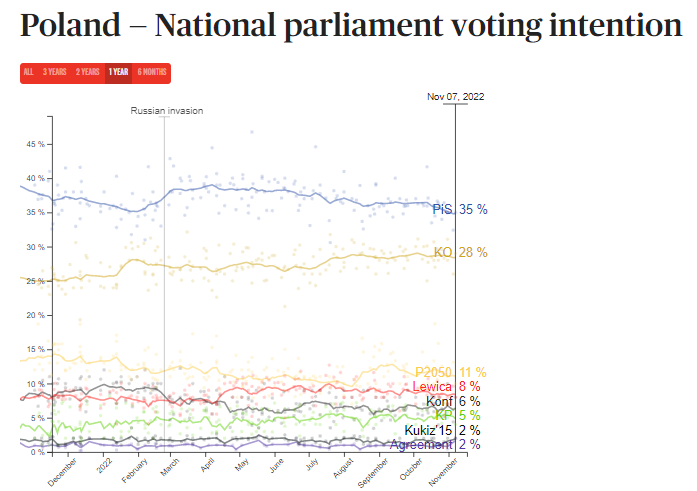
Source, with guide to party nomenclature and acronyms: https://www.politico.eu/
The split down the middle of the country, the blue east for PiS and the orange-red west for the opposition, was illustrated in the provincial vote of 2018. Local elections were held on October 21 of that year for all 16 provincial (voivodeship, województwo) assemblies, 380 county (powiat) councils, and 2,477 commune (gmina) councils. There were also direct elections for commune heads (mayors and city presidents). The outcome overall was victory for the PiS. The opposition PO and Civic Coalition (KO) maintained control of the majority of cities, including the capital Warsaw.
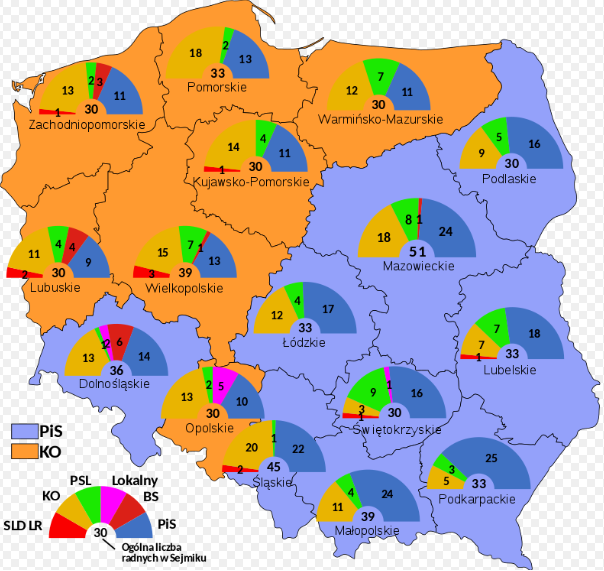
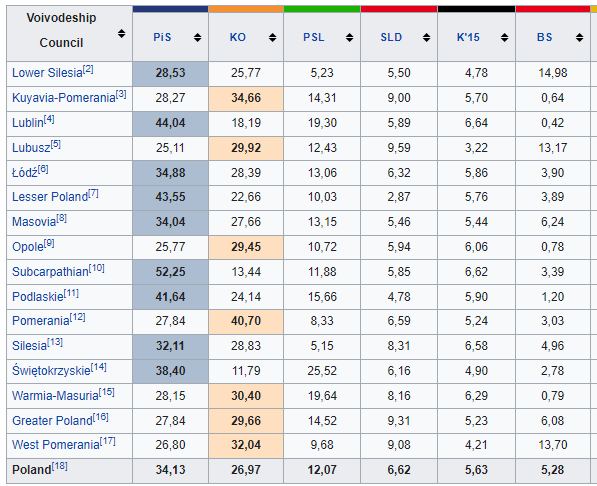
Source: https://en.wikipedia.org/
For chart displays and analysis of the east-west split in the Sejm and in the Duda election, read this.
Polish pollsters and sociologists have confirmed that this split between the urban elites and the rural voters is much older. But they have been reluctant to point out that in the cashflow which the war has generated, as the US, NATO and the European Union pour money, arms, advisers, special forces, and equipment through Poland and across the border, the Polish big-city commercial and political elites have been profiting.
Jarosław Flis is a well-known sociologist at Jagiellonian University in Cracow; his last academic study of Polish vote dynamics was published in 2015. In April of this year, immediately after the military operations began along with the surge into Poland of Ukrainian refugees, Flis said he expected a rally-round-the-flag effect to help the PiS in Warsaw. Balcerac said the same. Most Polish political analysts thought so, and the PiS leaders were reassured by their internal polling. That was also the political motive for Morawiecki and Kaczynski to stage their Zelensky meeting on March 15, and for Duda’s trip to Kiev on May 22.
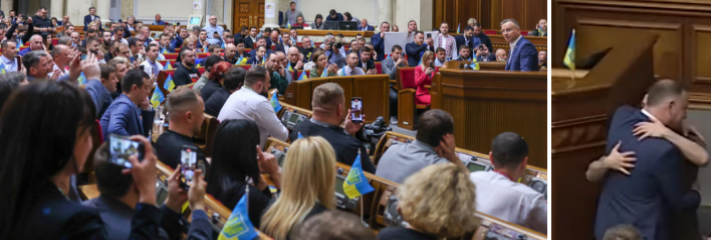
Left. President Duda at the rostrum of the Verkhovna Rada, May 22; right, President Zelensky embracing Duda at the conclusion of the speech. For the video record at the Ukrainian parliament, click.
This was the consensus countrywide in April. “The satisfaction of the traditional supporters of the government is not surprising, as almost 100 percent of them are in favour of the government’s policy regarding Ukraine — 48 percent considered the response to be ‘definitely good,’ and 49 percent ‘rather good.’ ‘I don’t find those results surprising, because everyone is giving Poles credit and talking about how fanatically we are helping,’ said Anna Materska-Sosnowska, a political scientist from the University of Warsaw. A similar point of view is presented by Jarosław Flis, a sociologist from the Jagiellonian University, who says that the results of the poll show that the rating breaks away from the political preferences in general. ‘In this poll, specific actions are being evaluated rather than political preferences. From the government’s perspective it means that it is not necessary to create internal conflicts to receive positive ratings,’ Flis added.”
That was then. What about now, six months later, as winter approaches?
The PiS leadership is unsure of itself and unsure of Polish voters. So they have used their majority in the Sejm to postpone the provincial elections from 2023 into 2024. Most Polish voters have reacted negatively to this ploy. “A United Surveys poll published yesterday by Dziennik Gazeta Prawna and RMF found that a majority of the public (57%) want the local elections to take place in autumn 2023 as planned, while only 21% want to delay them.”
The Sejm elections cannot be put off from next autumn. And now pollsters like Flis are warning that there’s a danger to the PiS from small-town independent candidates and party mavericks like Pakula from Lublin.

Szymon Holownia, an independent who ran for president in 2020, speaking during his campaign visit to Katowice. Source: https://balkaninsight.com//
Holownia is a journalist from Białystok, the largest Polish city in the northeast, bordering Belarus.
“Flis describes Polish society’s political preferences using a tree metaphor: the roots, made up of villages, are usually PiS voters; the crown, towns above 100,000, prefer the liberal opposition – so far, big city voters chose primarily the main opposition force PO; but the trunk, made up of small towns between 10,000 and 100,000 people, remain in contention, Flis argues, as the hundreds of mayors of these towns are at the moment neither under the sway of PiS nor that of PO.”
“Szymon Holownia [pictured above], who ran in the presidential election as an independent on a progressive Catholic platform, has since formed a political party and begun attracting parliamentarians from others parties. He might be tempted to move into this area, Flis says, though adding that so far it’s unclear whether Holownia has what it takes to achieve this. ‘Conquering ‘the trunk’ doesn’t work on its own; it’s not like these people are just sitting there waiting for salvation. You need a powerful idea to win,’ Flis said. ‘We’ve seen several such new political forces emerge in the last years, but more is needed to win than just being new… For the moment, we have order on the political scene: the old balance of power between PIS and PO is still there,’ he added.”
Balcerac has been reporting that the US Embassy in Warsaw and US government sources of money for Poland are backing the defeat of PiS next year by the PO, and the return to power of politicians like Anne Applebaum’s husband, Radoslaw Sikorski.
A North American expert in the electric war being conducted by the Russian Army cautions that the winter weather has yet to impact on the movement of Ukrainians across the Polish border. This is corroborated by the daily bulletins from by the Polish Border Guard. They reveal that in the week from November 9 through November 15, the average inflow per day of Ukrainians into Poland has been 19,400; the average outflow of Ukrainians back home, 19,900. Compare these numbers with the October daily average of 23,900 into Poland; the data were analysed here.
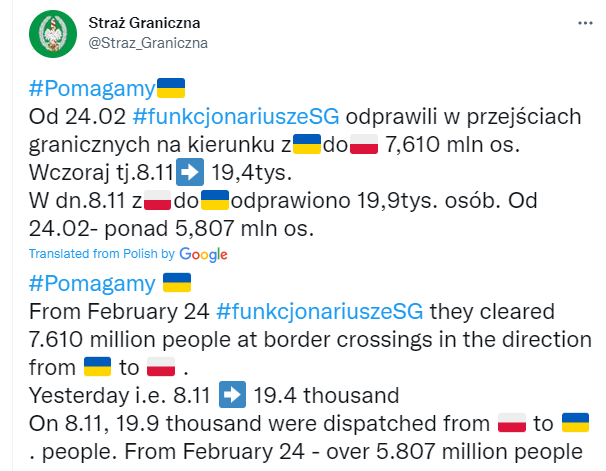
Source: https://twitter.com/straz_graniczna
Before the heavy Russian air raids of November 15, the peak border movements were recorded on November 12 – 25,200 entering Poland; 24,800 returning to the Ukraine. The Polish data for November 16 and 17 have not yet been released.
The weather forecast for Cracow, Lublin and Lvov, across the border, is almost the same; this indicates that the freeze has already begun in the evenings and the snow will arrive next week, though it may not freeze solid until the beginning of December.
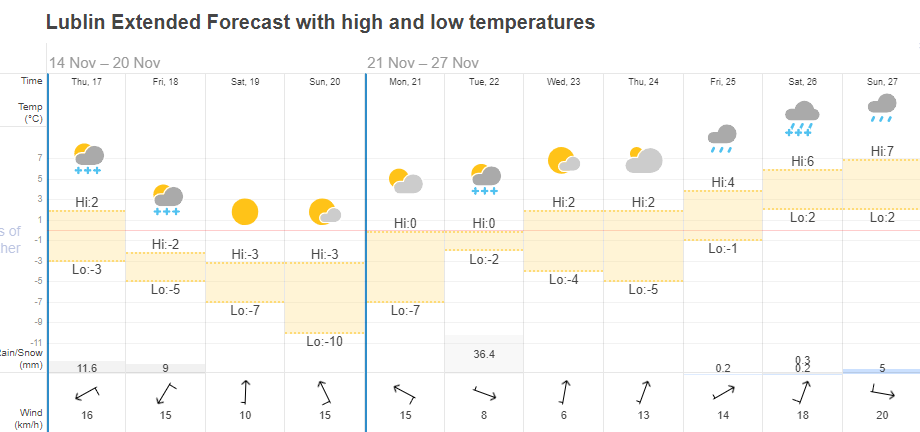
Source: https://www.timeanddate.com/
When the Russian electric war and General Winter strike in combination, what will Polish voters think then, and what they will tell the pollsters?
It is obvious to Polish analysts that when the surge of Ukrainian refugees across the border starts again, it will be in the regions and cities where the Ukrainian concentration is already highest that the political and economic impact will be registered most clearly. In April a Warsaw think tank reported these were the cities with the highest Ukrainian populations after the first surge:
PERCENTAGE INCREASE IN POLISH CITIES FROM UKAINIAN REFUGEE FLOW, FEBRUARY-APRIL 2022
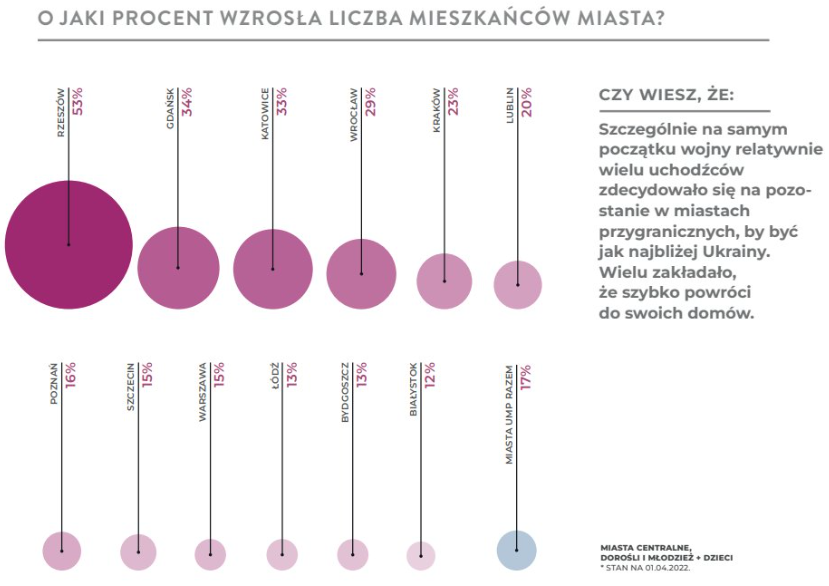
Key: Rzeszów: +53%; Gdańsk: +34%; Katowice: +33%; Wrocław: +29%; Kraków: +23%; Lublin: +20%; Poznań: +16%; Szczecin: +15%; Warsaw: +15%; Łódź: +13%. Source: “Urban hospitality -- rapid growth, challenges and opportunities”, Report on Refugees from Ukraine in the largest Polish Cities, Centre for Analysis and Research of the Union of Polish Metropolises, April 2022: https://metropolie.pl/
For comment.
The PiS and PO staffs have been busy analyzing what will happen to their voter support in these cities after the new surge. For the time being there are no public poll results available.
What can be expected, however is that this will be obvious in Rzeszow, which is a town of 184,000 located south of Lublin and midway between Cracow and Lvov. In its last council election in June 2021, the opposition PO won with 57%, while the PiS trailed at 24%. It was an unexpected landslide against the PiS, the local press reported at the time. In Cracow, where the Ukrainian concentration is much less, the PiS is in the minority of the city council.
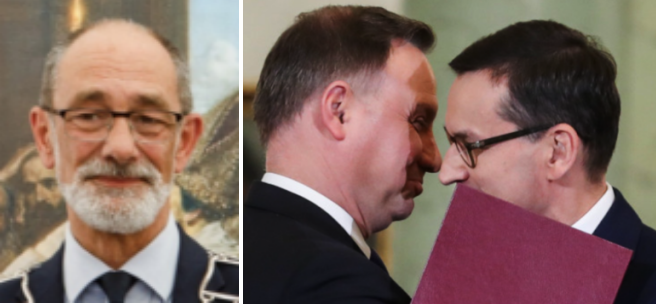
Left to right: Jaroslaw Pakula, Andrzej Duda, Mateusz Morawiecki.
It is here in Polish Galicia that the Ukrainian attack on Przewodów and Zelensky’s lying about it strike hardest. Who now speaks for the Poles? – Pakula in Lublin or Duda and Morawiecki in Warsaw? And if it turns out that Zelensky can’t hold on to the Poles, will his grip on the Germans and French fail soon after?
[*] Pronounced PSHEH VAW DOOF.











Leave a Reply